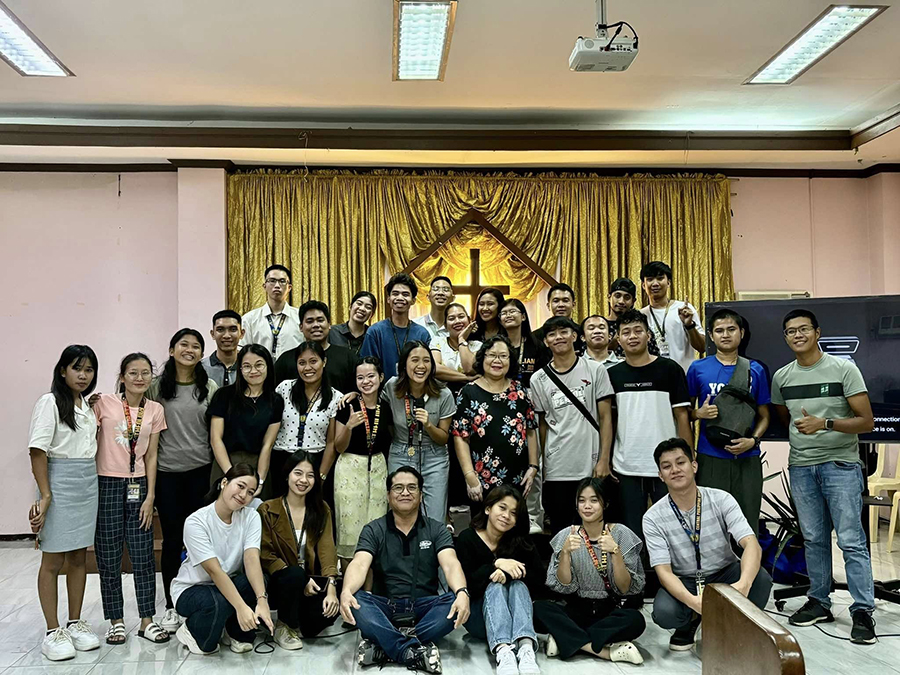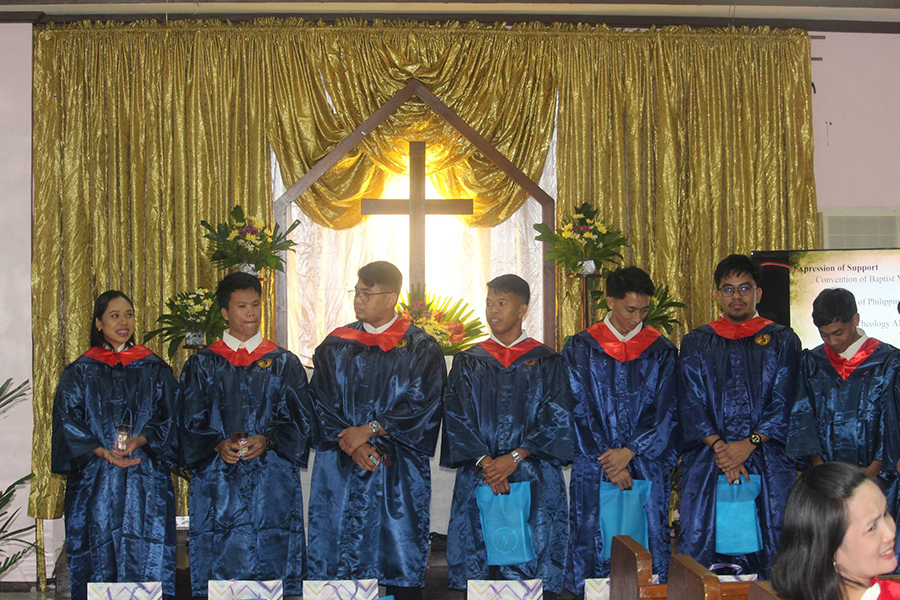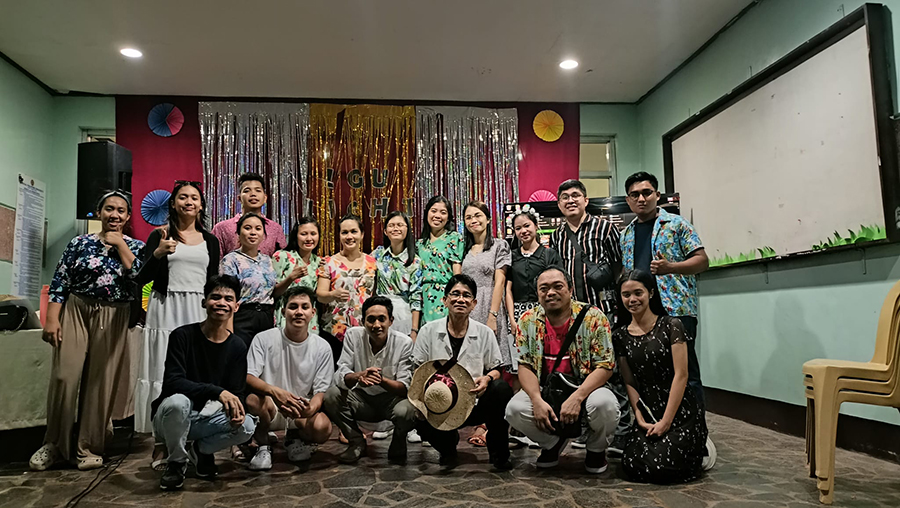By Karren Jay G. Asgar & Mikee N. Norico
A moment of reflection and unity! CPU College of Theology marks the first Chapel Hour for the first semester of School Year 2024-2025. Are you ready to deepen your faith and commitment? Begin your journey at CPU-COT!
If you’re passionate about pursuing a career in theology, ministry, or religious studies, the College of Theology at Central Philippine University offers an inspiring academic environment where you can deepen your faith, enhance your knowledge, and prepare for a meaningful career in service to others.
To cater to individuals seeking theological education and ministerial training, the CPU-College of Theology offers a diverse range of programs. The Certificate in Christian Ministry (CCM) and the Diploma in Christian Ministry (DCM) provide laypersons with foundational knowledge in Scripture, church doctrines, and Christian education. The Bachelor of Theology (B.Th.), a four-year undergraduate program accredited by ATESEA, offers a comprehensive theological education for those pursuing ministry or related fields. At the graduate level, the Master of Arts in Pastoral Counseling (MAPC) focuses on counseling and pastoral care, while the Master of Ministry (MMin) prepares individuals for leadership roles in religious institutions. The Master of Divinity (M.Div.), a two-year professional ministry program accredited by ATESEA, and the Master of Theology (M.Th.), which provides advanced theological education for specialization in research or ministry, offer further academic and professional growth opportunities. The Doctor of Ministry (D.Min.) serves those with an M.Div. or equivalent, enhancing their ministerial leadership.
“The CPU College of Theology was established to train individuals for ministry in churches and Christian organizations. Over the years, it has broadened its academic offerings to ensure students receive a comprehensive theological education encompassing biblical studies, pastoral ministry, and social engagement,” Rev. Dr. Bernabe C. Pagara, Dean of the College of Theology shared in an interview.
A commitment to service and faith! CPU College of Theology celebrates their Commissioning Service for School Year 2023-2024. Are you prepared to serve with purpose? Join the mission at CPU-COT!
The College of Theology at Central Philippine University (CPU) has its origins in the early Baptist mission work in the Philippines. The mission began in 1904 with the establishment of a Baptist Home School in Capiz, which later became Filamer Christian University, and a Bible School for women in Iloilo, which evolved into the Baptist Missionary Training School (BMTS). In 1905, the Jaro Industrial School, the foundation of CPU, was officially opened, and the Bible School began operations in June of the same year. Though it temporarily closed in 1912, it was reopened in 1913. By 1924, the Bible School was fully integrated into the institution, and in 1936, the Department of Theology was established to offer a more focused theological training.
In 1938, BMTS merged with the Department of Theology, leading to the introduction of the Bachelor of Theology and Bachelor of Science in Religious Education programs. When CPU gained university status on April 1, 1953, the Department of Theology was elevated to the College of Theology, further solidifying its place within the academic structure of the institution.
“Initially, the College of Theology offered the Bachelor of Theology (B.Th.). To meet the increasing demands of churches and religious institutions, graduate programs such as the Master of Divinity (M.Div.) and Master of Theology (M.Th.) were introduced, providing pastors and church workers with opportunities for advanced theological education. Recognizing the need for specialized ministerial training, the College launched the Master of Arts in Pastoral Counseling (MAPC). The first two cohorts of this program were fully sponsored by International Ministries, USA, making it accessible to students seeking to develop their pastoral care skills,” Rev. Dr. Pagara remarked.
To meet the growing demand for advanced ministerial leadership, Central Philippine University (CPU) introduced the Doctor of Ministry (D.Min.) program, offering two major specializations. The first, Pastoral Counseling and Clinical Pastoral Supervision, focused on pastoral care, counseling, and preparing ministers for chaplaincy and clinical supervision. The second, Church Management and Practical Ministries, is designed to equip church leaders with the administrative, leadership, and ministry skills needed to improve church governance and strengthen community engagement. “The D.Min. program has significantly enhanced CPU’s standing as a hub for ministerial excellence in the region.”
A night of fellowship and celebration! CPU College of Theology shines during LGU Night 2024, a gathering of unity and support. Are you ready to make a difference? Be part of CPU-COT’s vibrant community!
The College of Theology at Central Philippine University (CPU) recently achieved a significant milestone with the successful re-accreditation of its Bachelor of Theology (B.Th.), Master of Divinity (M.Div.), and Master of Theology (M.Th.) programs by the Association for Theological Education in Southeast Asia (ATESEA), as shared by Rev. Dr. Pagara.
“This accreditation affirms CPU’s commitment to maintaining international standards in theological education, faculty qualifications, curriculum development, and student formation. Moreover, the re-accreditation process played a crucial role in securing CPU’s Autonomous Status, which grants the university greater academic freedom in curriculum development, increased opportunities for funding and research, and enhanced recognition of its excellence in higher education,” he added.
The CPU College of Theology has a strong tradition of producing pastors, missionaries, educators, and church leaders who serve both locally and globally. Its specialized programs, such as Pastoral Counseling and Clinical Pastoral Supervision, have contributed significantly to the professionalization of pastoral care in the Philippines and beyond. Additionally, the college is deeply committed to social and community outreach, tackling critical issues like poverty, justice, and ethical leadership through its curriculum and fieldwork programs.
“The CPU College of Theology is committed to providing a well-rounded theological education that integrates academic excellence, spiritual formation, and practical ministry experience. Rooted in the Baptist tradition, the college equips students with critical thinking skills, biblical knowledge, and contemporary ministry approaches, preparing them for roles as pastors, missionaries, church leaders, and educators. With a faculty composed of highly qualified professors who combine academic expertise with hands-on ministerial experience, students benefit from both theoretical insights and real-world application.”
Beyond academics, the College of Theology cultivates a vibrant spiritual community where students participate in prayer groups, retreats, and mission activities that strengthen their faith. Through internships and field education programs, students gain practical experience in various ministry settings, including local churches, urban centers, and cross-cultural missions. “As part of Central Philippine University, students have access to interdisciplinary learning, extensive library resources, and strong alumni and partner networks. The college’s emphasis on servant leadership, social responsibility, and ecumenical dialogue distinguishes it as an institution that prepares students to become transformative leaders in both church and society.”
Rev. Dr. Pagara’s message to the incoming Centralian students of the College of Theology emphasizes that the journey is more than an academic pursuit—it is a calling. Theological education is about deepening one’s faith, discovering one’s purpose, and preparing for meaningful service. As students embark on this path, he encourages them to embrace both the academic and spiritual aspects of their studies. He advises them to engage deeply with their coursework, seek wisdom from professors and mentors, and actively participate in worship, prayer groups, and mission activities. Building strong relationships with fellow students, faculty, and the broader theological community will offer encouragement and inspiration throughout their journey.
“Remember, your time at the College of Theology is not just preparation for ministry—it is a season of transformation. Allow God to shape your heart, refine your calling, and equip you for the challenges and opportunities ahead. Trust that the knowledge, skills, and experiences gained here will bear fruit in ways beyond what you can imagine. Stay committed to your studies, nurture your faith, and remain open to God’s guidance as you step into the ministry, He has prepared for you.”
For students who wish to enroll in the above said programs under the CPU-College of Theology, the CPU College Aptitude Test (CPUCAT) is now open for admissions. For more information, kindly access this link: https://cpu.edu.ph/cpu-college-aptitude-test-cpucat/



